Christ Before Me, Christ Behind Me: God Made Visible through a Year of Teaching
BY DANIEL SIMONDS | September 6, 2018
From the beginning, I knew Detroit Cristo Rey was different. Just in the first week, one of my future students, Jenna, was consulting me for guidance regarding a pre-college summer program centered around law. The alluring co-curricular was out-of-state, however, which posed roadblocks in the form of costs and transportation. It wouldn’t be long before this kind of interaction became my day-to-day as a full-time employee in the college counseling office. Only months removed from crossing the stage to receive my diploma from Gordon College, a school worlds away from Southwest Detroit in distance and socioeconomics, I was immersed in teaching, for which I lacked an appropriate degree, and college support, a season of life of which I was only recently transitioning from.
As I stepped gingerly into a classroom of 25 excitable ninth-graders, I could feel my lack of experience in my speaking cadence and frenetic energy. My goal was to present a class equipping these 14-year-olds to handle a uniquely rigorous college-prep corporate work-study secondary education. It felt as if the students expected me to perform a jazz solo, when, in reality, I was just learning the chords of quieting a classroom to advance a lesson plan or practice pedagogical politics by encouraging equally anxious ninth-graders to recognize when another student “has the floor.”
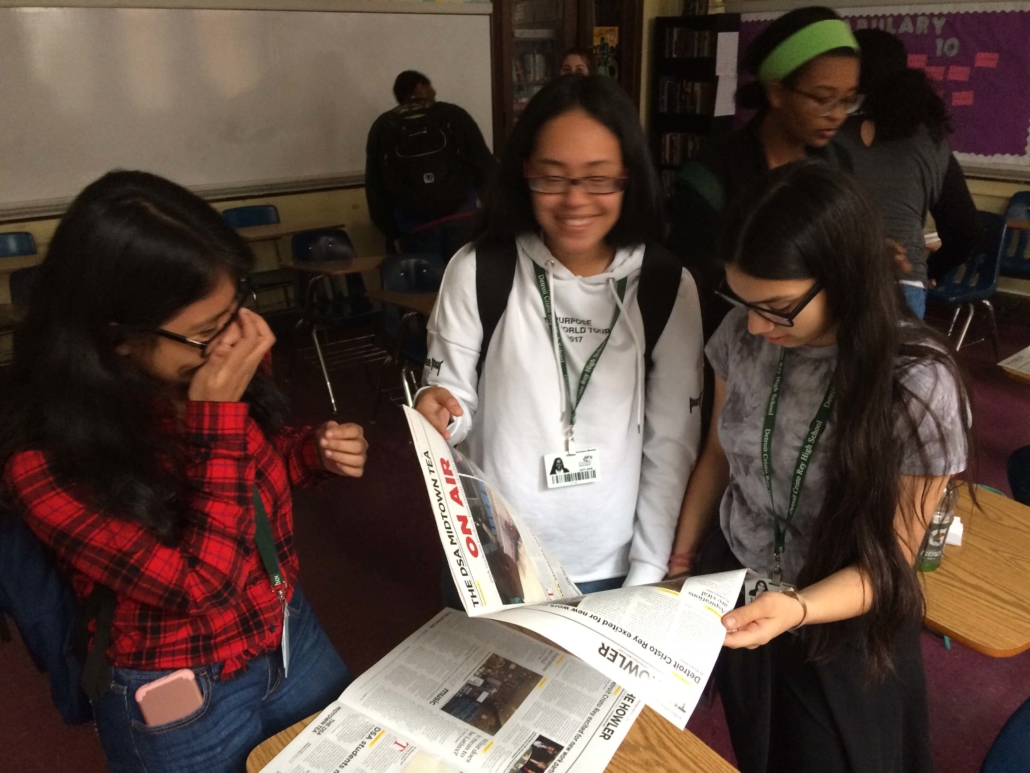
Journalism Club members and College Readiness 11 students, Giovanna, Jackelyn, and Yoceline, giddily view their articles in the academic year’s first edition of Detroit Dialogue, a quarterly magazine published through Michigan State and Crain Communications featuring the journalistic work of 13 Detroit high schools.
Meanwhile, in College Readiness 11, I was encountering the realities of urban education. In our standardized test-centered academic climate, I thought it prudent to administer to my students a healthy dose of Khan Academy SAT Prep. Unfortunately, what I didn’t know was that a handful of students from each class would go home to an environment in which their school-assigned Chromebooks would, quite literally, transform into illuminated pieces of plastic, reminders of the inequality they experienced without internet access. Growing up in American suburbia, I would’ve been hard-pressed to find a high school classmate who lacked wifi in the confines of their home.
Prior to JVC, this pitiful realization is where I would have settled any social justice quandary.
But after an October check-in with my program coordinator, I was startled into reframing my thinking about those experiencing marginalization. I was challenged to see them as worthy of fighting alongside through means of political advocacy rather than, solely, well-meaning charity.
“What would you like to do about this issue?” Beth asked.
I was bewildered.
“I can do something,” I replied in a moment of enlightenment.
What I did not realize in this moment was that, while a portion of students at Detroit Cristo Rey lack a utility fundamental to American life: internet access, which is, indeed, an injustice that should be voiced; what I can do as a Jesuit Volunteer is serve at my placement, eschew an attitude of charity and, instead, embrace what welcomes relationship: accompaniment.
For, so often do we pray to see God working in our lives and seek out spiritual experiences through retreats and ecstatic faith experiences.
Yet, through my time at Detroit Cristo Rey, I’ve seen God in a jovial student government member and top College Readiness class contributor. Arebre’A has shown God to me as she’s managed to joyfully and charismatically navigate high school, despite a familial void. Resiliently, Arebre’A has decided to rewrite her family history and become an accountant, or, perhaps, work in the business world, given her personality.
Cristian, meanwhile, entered College Readiness 11 with a reputation for attitude. In my experience, however, this candid, well-meaning, self-assured 16-year-old was searching for affirmation. It wasn’t difficult to “see the best” in Cristian, who aspires to attend community college as a means of opening his own electrician practice. Cristian reciprocated a mutual respect by taking our college-prep class seriously, eagerly vying for SAT test prep victor with another changemaker, Sebastian.
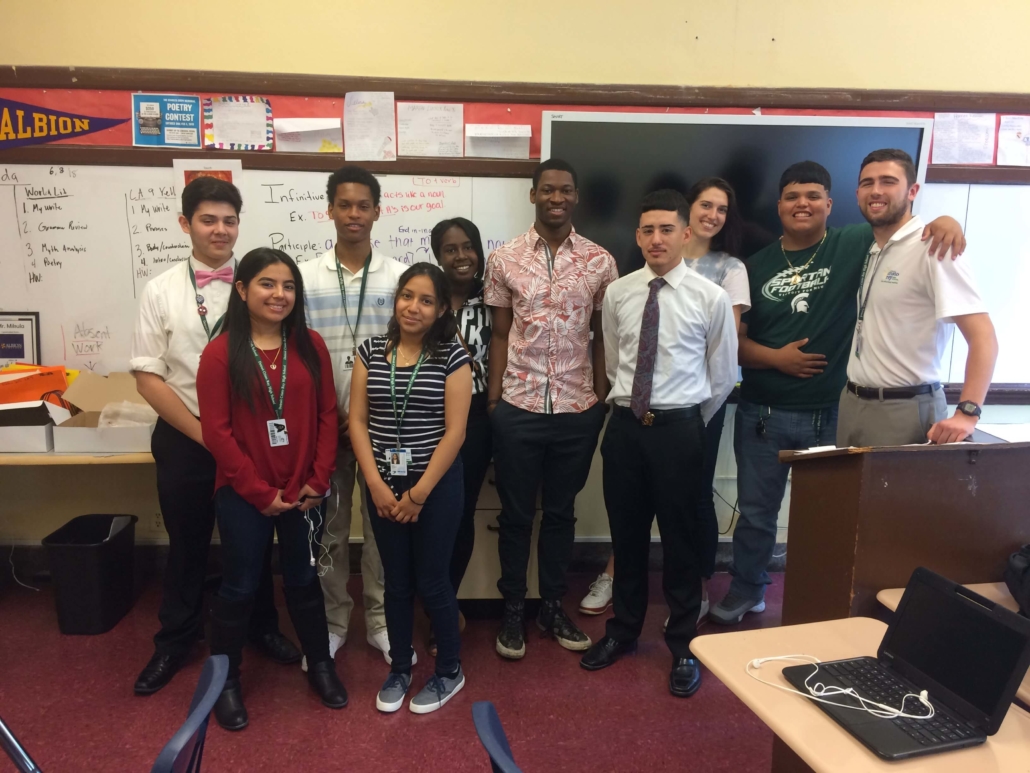
Period 3 College Readiness 11 class on their last day of classes, including Cristian (second from left, back row), Arebre’A (third from left, back row), and Sebastian (fourth from right, back row).
This is a student who I expected to catalyze off-topic conversation with his baseball buddy, Carlos. Fortunately, this visionary of bringing a Latino music hall to Southwest Detroit saw the inherent promise in College Readiness 11 and brought life to the room of ten with his questions, answers, as well as his pre- and post-lesson banter.
Arebre’A, Cristian, and Sebastian all pointed me toward God like the figures within a medieval Byzantine painting would—yet, not inside a church in the Umbrian countryside of my semester abroad, but in the working-class neighborhood Catholic high school of Mexicantown Detroit.
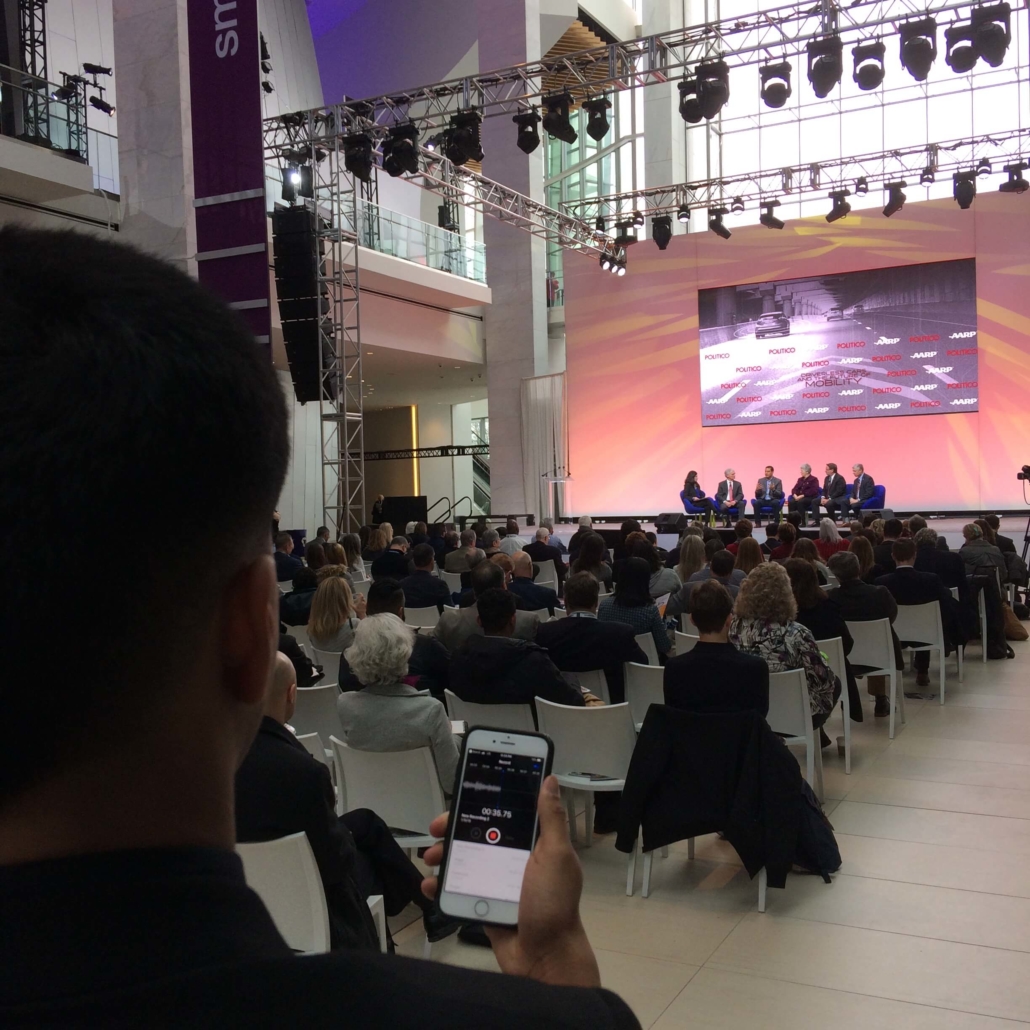
As a Journalism Club co-advisor, Daniel had the opportunity to chaperone junior Jorge Reyna on assignment at the North American International Auto Show held in January at the Cobo Center in Detroit, MI. Reyna is seen recording a Politico Live discussion titled, “Driverless Cars and the Future of Mobility.”
Perhaps most redeeming from my abbreviated tenure at Detroit Cristo Rey have been the elusive “God” moments. A fist bump from the school’s Michael Jackson impersonator-in-residence during morning check-in. A student pulling me out onto the dancefloor to ‘dougie’ to “God’s Plan,” as we had previously agreed upon before “Snowcoming.” The cross country runners requesting to stage an “Amazing Pace” every practice, a distance running scavenger hunt I personalized for Mexicantown. Through all of these blessings, being a part of these teenagers’ lives has enriched my own beyond recollection. For God was moving in the smiles between classes, the healthy debates of “Opinion Question of the Day,” and in the self-discovering dialogues of grade-level retreats.
1 Kings 19:11-13 speaks of a time when the prophet, Elijah, is instructed by the Lord to stand atop a mountain nearby and embrace God’s transitory presence. Earthquakes, wind, and fire pass by without a hint of God’s glory. But then, came a gentle whisper.
“What are you doing here, Elijah?”
Regardless of our season in life, that yearning for a purpose in the everyday is not just a human impulse, it is from God. For, God goes on to instruct Elijah of his next steps, returning to Damascus, the future site of the apostle Paul’s conversion, to set things right. Clearly, following God’s path figuratively and literally proved effective for Elijah. And, through my transformative year away from the insulated confines of North Shore Massachusetts and in the heart of American rebirth, both municipally and in the innovative Cristo Rey model, I have seen God in those around me, painting the portrait of accompaniment that I could have only accessed through the experience that JVC can offer.
Emerging from a liberal arts education, I was left with a dizzying array of interests, muddling my purpose in the process. Yet, this JVC season of life, I have learned, is a time to present myself on the mountain, enter God’s confrontation, give my own calculated human response, only to be presented God’s intentional path. For, isn’t that how I arrived at this point in the first place?
Dan Simonds is a second year Jesuit Volunteer who, after a year teaching at Detroit Cristo Rey High School, is continuing his westward trek from the smallest town, Warren, in the smallest state, Rhode Island. He is serving in 2018-2019 as a Student Services Coordinator at Homeboy Industries in Los Angeles, California. Dan calls Gordon College—a small Christian liberal arts college near Boston—his alma mater.

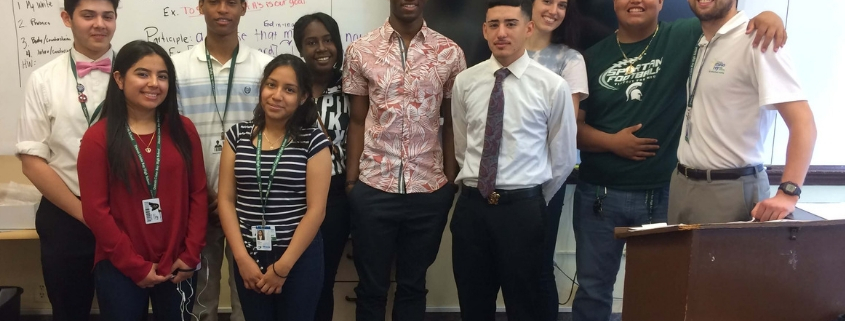

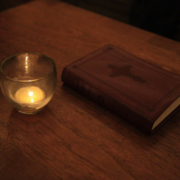

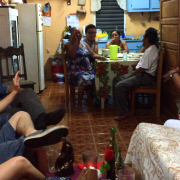
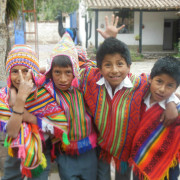
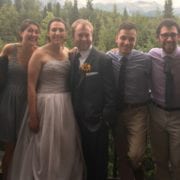

Christ has died, Christ is Risen, Christ will come again.